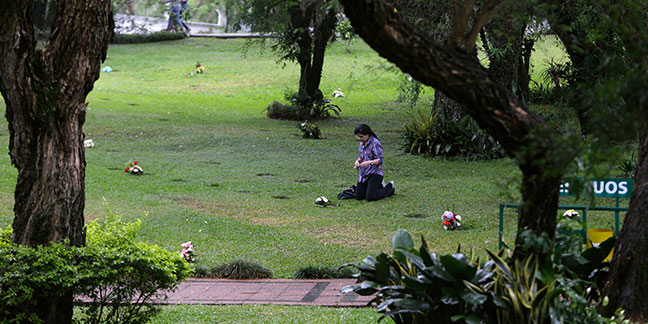 A woman prays at the grave of a relative at a cemetery during the observance of All Souls' Day in Asuncion, Paraguay, in this Nov. 2, 2014, file photo. With the continuing pandemic, the Vatican has again extended throughout all of November the opportunity to receive a plenary indulgence for visiting a cemetery to pray for the dead. (CNS photo/Jorge Adorno, Reuters)VATICAN — This year, the Vatican has decided once again to grant a plenary indulgence to Catholics who visit a cemetery to pray for the dead on any day in the month of November.
A woman prays at the grave of a relative at a cemetery during the observance of All Souls' Day in Asuncion, Paraguay, in this Nov. 2, 2014, file photo. With the continuing pandemic, the Vatican has again extended throughout all of November the opportunity to receive a plenary indulgence for visiting a cemetery to pray for the dead. (CNS photo/Jorge Adorno, Reuters)VATICAN — This year, the Vatican has decided once again to grant a plenary indulgence to Catholics who visit a cemetery to pray for the dead on any day in the month of November.
In a typical year, the Church only grants this plenary indulgence for the souls in Purgatory to those who pray in a cemetery on Nov. 1-8, the week of the Solemnity of All Souls’ Day.
But last year the Apostolic Penitentiary issued a decree that extended the availability of certain plenary indulgences amid concerns about avoiding large gatherings of people in churches or cemeteries due to the COVID-19 pandemic.
The Vatican announced on Oct. 28 that this same decree would also apply in November 2021.
This includes the particular Nov. 2 plenary indulgence one can receive for one’s own soul by visiting a church or an oratory and reciting an Our Father and the Creed, which can now also be done on any day in November.
A plenary indulgence remits all temporal punishment due to sin. It must always be accompanied by a full detachment from sin.
A Catholic who wishes to obtain a plenary indulgence must also fulfill the ordinary conditions of an indulgence, which are sacramental confession, reception of the Eucharist, and prayer for the pope’s intentions.
Sacramental confession and reception of the Eucharist can occur up to about 20 days before or after the indulgenced act.
With the decree for pandemic conditions, those who cannot leave home, such as the sick and the elderly, can still obtain an indulgence by reciting prayers for the deceased before an image of Jesus or the Virgin Mary.
They must also spiritually unite themselves to other Catholics, be completely detached from sin, and have the intention of fulfilling the ordinary conditions as soon as possible.
The Vatican’s decree offered examples of prayers that homebound Catholics can pray for the dead, including lauds or vespers of the Office for the Dead, the rosary, the Chaplet of the Divine Mercy, other prayers for deceased among their family or friends, or performing a work of mercy by offering their pain and discomfort to God.
According to the Catechism of the Catholic Church, believers have honored and prayed for the dead from the earliest days of Christianity.
“From the beginning, the Church has honored the memory of the dead and offered prayers in suffrage for them, above all the Eucharistic sacrifice, so that, thus purified, they may attain the beatific vision of God,” the catechism states in paragraph 1032.
“The Church also commends almsgiving, indulgences, and works of penance undertaken on behalf of the dead.”
“Let us not hesitate to help those who have died and to offer our prayers for them,” it says.
— CNA


